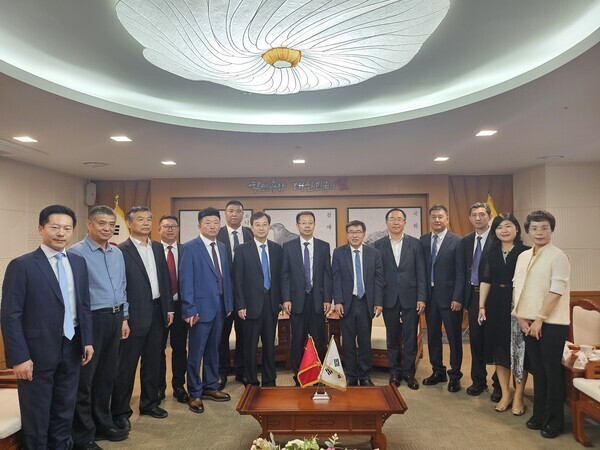
Chungcheongnam-do (South Chungcheong Province) and China's Hebei Province have engaged in discussions to deepen economic cooperation and exchange. On May 30, Jeon Hyung-sik, Vice Governor for Political Affairs of Chungcheongnam-do, met with Zhao Bin, Vice Chairman of the Hebei Federation of Industry and Commerce, and a delegation of 17 business representatives at the provincial office to explore ways to expand practical economic and trade cooperation between the two regions.
Chungcheongnam-do and Hebei Province have maintained a sister-city relationship for over 30 years, consistently fostering exchange and cooperation as long-standing international partners. This historic relationship has evolved beyond simple goodwill into a long-term partnership that seeks mutual economic benefits.
Hebei Province is a strategically important location adjacent to Beijing, China's capital. It boasts strong industrial capabilities, supported by a vast population of approximately 75 million. The region has established itself as a major production hub in China, particularly in the steel, automobile, and chemical industries. Recently, it has also been actively investing in and nurturing future growth engines such as new energy, the digital economy, and green industries. This aligns with the Chinese government's policies for industrial structure upgrading and eco-friendly transition, indicating an acceleration towards high-value-added industries. These industrial changes in Hebei Province offer the potential to diversify areas of cooperation with Chungcheongnam-do.
This visit by the Hebei Province delegation follows up on the economic exchange agreement signed between the Chungnam Northern Chamber of Commerce and Industry and the Hebei Federation of Industry and Commerce during Governor Kim Tae-heum's visit to China last November. At that time, both organizations agreed to establish a business-focused exchange platform and expand mutual cooperation. This reflects a commitment to creating a sustainable economic cooperation system rather than one-off exchanges, focusing on laying the groundwork for businesses in both regions to directly generate business opportunities.
During the meeting, Vice Governor Jeon Hyung-sik emphasized that Chungcheongnam-do is a key region leading advanced industries in South Korea, including semiconductors, secondary batteries, and eco-friendly energy. He stated, "The combination of Chungcheongnam-do's advanced technology and Hebei Province's strong industrial base will provide new growth opportunities for businesses in both regions," underscoring the importance of complementary cooperation. He added, "Chungcheongnam-do will continue to actively support the activation of sustainable and practical international economic cooperation at the local level," clearly stating the government's willingness to provide support. These remarks suggest that Chungcheongnam-do will actively pursue not only trade expansion but also technological cooperation and joint investment attraction in advanced industrial sectors.
Prior to visiting the provincial office, the Hebei Province delegation visited
CheongKwanJang in Buyeo to tour its ginseng production facilities. This reflects the interest of food and health industry-related companies in Hebei Province and is interpreted as an intention to benchmark Korea's excellent agricultural product processing technology and brand power. Afterward, the delegation moved to the Chungnam Northern Chamber of Commerce and Industry to hold a discussion with 11 businesses from the province. Chungnam companies from various fields, including those producing automotive materials and industrial films, participated in this session to discuss concrete business cooperation possibilities with Hebei Province companies. These direct exchanges between individual businesses are expected to play an important role in yielding practical results in economic cooperation between the two regions.
These discussions on economic cooperation between Chungcheongnam-do and Hebei Province demonstrate the potential for creating economic synergy based on long-standing trust between the two regions. Notably, efforts to explore the harmonious development potential of advanced and traditional industries and to build a future-oriented cooperation model stand out. Moving forward, both regions are expected to further activate practical exchanges between businesses and discover new investment opportunities, thereby contributing to mutual economic development.
[Copyright (c) Global Economic Times. All Rights Reserved.]






























